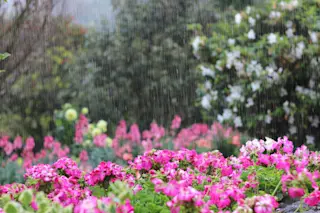This article was originally published on May 26, 2022.
As urban areas expand throughout the planet, the more challenges develop with water treatment. Sewage is one thing, but storm runoff is also a problem. The rain that falls on cities and towns picks up pollutants or nutrients before it washes into waterways.
Rain gardens are one way to alleviate some of the pressure from water runoff. They act as sinks, absorbing the precipitation back into the soil where plants or trees can use it.
“It’s a low-cost way to treat water, to take pollutants out of the water and improve the water quality,” says David Deegan, a spokesperson for the U.S. Environmental Protection Agency’s Boston regional office.
Before we invented cities and concrete towns, forests and grasslands had a natural way of dealing with the runoff from rainstorms. The soil would absorb this water and the roots of plants and ...















